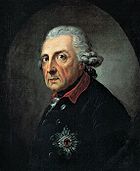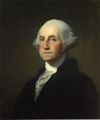
Treaty of Amity and Commerce (Prussia-USA)
Encyclopedia


The Treaty of Amity and Commerce between the Kingdom of Prussia and the United States of America (September 10, 1785) was a treaty negotiated by Count Karl-Wilhelm Finck von Finckenstein
Count Karl-Wilhelm Finck von Finckenstein
Karl Wilhelm Finck von Finckenstein was a Prussian diplomat and later Prime Minister of Prussia.He was the son of Count Albrecht Konrad Finck von Finckenstein, who was a Field Marshal and Governor of the Crown Prince, the future King Frederick II. Karl Wilhelm studied in Geneva and traveled in...
, Prussian Prime Minister, and Thomas Jefferson
Thomas Jefferson
Thomas Jefferson was the principal author of the United States Declaration of Independence and the Statute of Virginia for Religious Freedom , the third President of the United States and founder of the University of Virginia...
, United States Ambassador to France
United States Ambassador to France
This article is about the United States Ambassador to France. There has been a United States Ambassador to France since the American Revolution. The United States sent its first envoys to France in 1776, towards the end of the four-centuries-old Bourbon dynasty...
, and signed by Frederick the Great and George Washington
George Washington
George Washington was the dominant military and political leader of the new United States of America from 1775 to 1799. He led the American victory over Great Britain in the American Revolutionary War as commander-in-chief of the Continental Army from 1775 to 1783, and presided over the writing of...
. The treaty established a commercial alliance between the Kingdom of Prussia
Kingdom of Prussia
The Kingdom of Prussia was a German kingdom from 1701 to 1918. Until the defeat of Germany in World War I, it comprised almost two-thirds of the area of the German Empire...
and the United States of America and was the first one signed by a European power with the United States after the American Revolutionary War. The Kingdom of Prussia became therefore one of the first nations to officially recognize the young American Republic.
The Treaty was signed to promote free trade and commerce and become a benchmark for subsequent free trade agreements and treaties.
Additionally, the Treaty demanded the unconditionally humane custody for war prisoner, a novelty at the time.
The Treaty was renewed in 1799 after negotiations with United States Ambassador to Prussia John Quincy Adams
John Quincy Adams
John Quincy Adams was the sixth President of the United States . He served as an American diplomat, Senator, and Congressional representative. He was a member of the Federalist, Democratic-Republican, National Republican, and later Anti-Masonic and Whig parties. Adams was the son of former...
(1797 -1801).
Main Provisions
- Peace and friendship between the Kingdom of Prussia and the U.S.
- Mutual Most Favored Nation status with regard to commerce and navigation
- Mutual protection of all vessels and cargo when in U.S. or Prussian jurisdictionJurisdictionJurisdiction is the practical authority granted to a formally constituted legal body or to a political leader to deal with and make pronouncements on legal matters and, by implication, to administer justice within a defined area of responsibility...
- Mutual right for citizens of one country to hold land in other's territory
- Mutual right to search a ship of the other's coming out of an enemy port for contrabandContrabandThe word contraband, reported in English since 1529, from Medieval French contrebande "a smuggling," denotes any item which, relating to its nature, is illegal to be possessed or sold....
- Mutual right to trade with enemy states of the other as long as those goods are not contraband
- If the two nations become enemies nine months protection of merchant ships in enemy territory
- Novelty: Unconditionally humane custody for war prisoner
- Mutual right to have Counsuls, Vice Counsuls, Agents, and Commissaries of one nation in the other's ports
Sources
Giunta, Mary A., ed. Documents of the Emerging Nation: U.S. Foreign Relations 1775-1789. Wilmington, Del.: Scholarly Resources Inc., 1998.Middlekauff, Robert. The Glorious Cause: The American Revolution, 1763-1789. New York: Oxford University Press, 1982.
"Treaty of Amity and Commerce," The Avalon Project at Yale Law School. http://avalon.law.yale.edu/subject_menus/18th.asp. Accessed 10 September 2010.

